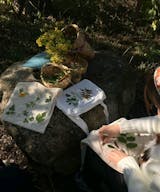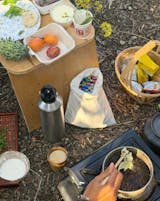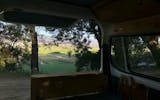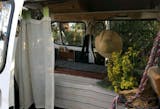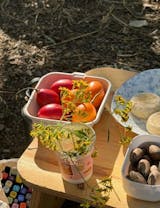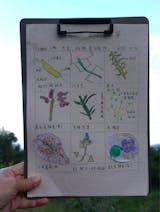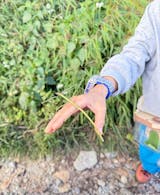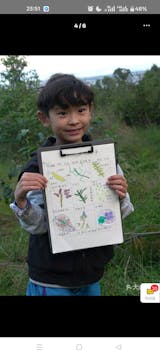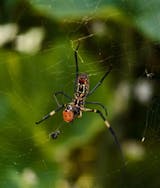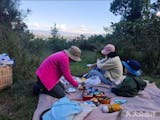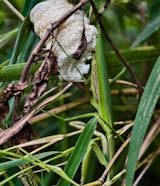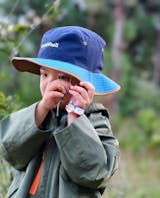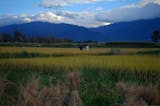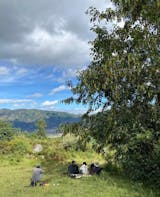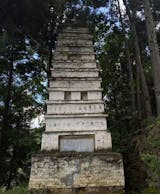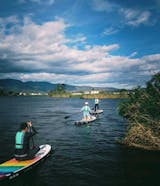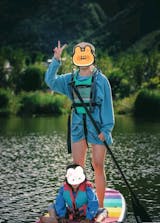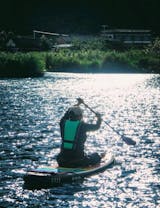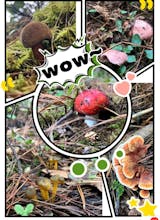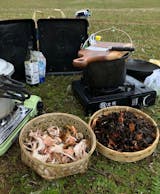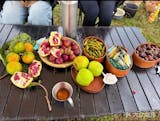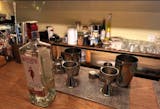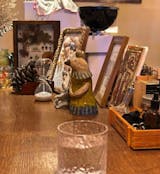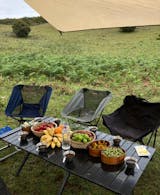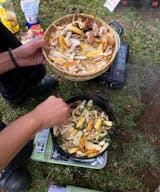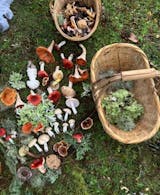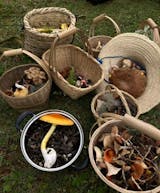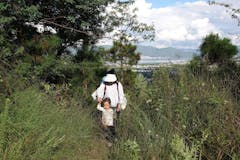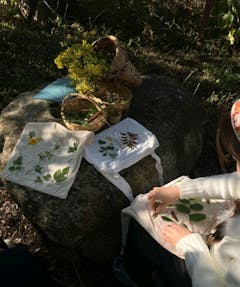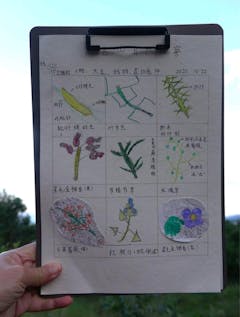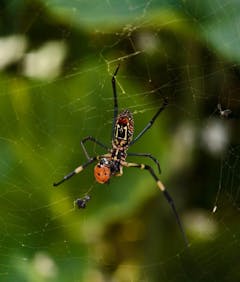Su Ya, a Yunnan writer living in Dali, wrote a new book, "Farther Blue Flow", which is one of the few (perhaps the first) to write about Dali, Cangshan Mountain, birds, plants, four seasons, and her life of exploring nature from a natural perspective. It also records some observations of other places in Yunnan, but the in-depth part is mainly based on Dali where she lives.
As a group that hikes in Dali, observes nature, and makes plant specimens, we feel closer to the book and see many familiar species. We also feel the richness and rigor of Suya's knowledge in this area. Often a small paragraph of text incorporates a lot of natural knowledge.
The black-winged kites, golden pheasants, different types of cuckoos in Cangshan, various wild flowers in spring, and porcupine quills she mentioned in the book are all common life in Dali. Many people here have seen them, but they may not know their names. There are also many birds and plants that most people don’t know or have never seen, so it can even be used as a guide for plant or bird watching enthusiasts to understand the birds and plants around Dali (the plants are mainly Cangshan). Through this book, you will also learn about the eighteen streams in Cangshan, different peaks, some of which will be written in detail; some information about the Hengduan Mountains, and the relationship between the Cangshan Mountains and other mountains in the Hengduan Mountains, and you will understand this area from a broader level.
She is a nature observation enthusiast and a meticulous observer of life and herself, so her angle of description and depth of observation are very special. She is not only a nature enthusiast who strives for rigor, but also presents these natural science information through literary imagination and observation.
In addition, Suya was accompanied by Yan Zi, an outdoor cross-country runner and a great outdoor guide in Dali, on some of the summit hikes at Cangshan Mountain. If you need similar assistance, you can contact Yan Zi on WeChat: dream5621
Her previous book, "Seeds Falling in the Soil", is about the farming life of a Japanese youth named "Six" in Dali and his previous growth experiences.
I saw these two books are on sale at " Pu Shi Baking ".
Here are two good book reviews that introduce Suya and this book from a unique perspective. How to buy the author's signed edition on JD.com. I added a section about Dali's books, starting with this book.
JD.com purchase link: Farther Blue Run
You can also contact Suya, or the author's signed version, Suya WeChat: xuguoguo1
Suya gave Honghong a signed copy:

Mr. Fu Weici’s message to Suya’s book: Wander around when you have free time, and read when you are bored.

Suya is a writer living in Dali. Her book "Farther Blue Flow" is about the mountains, birds, flowers and plants in Dali. She is a nature observation enthusiast, and she just uses her pen to write about everything about the nature of Dali that she loves. Her other book before was "Seeds Falling in the Soil", which is about the life of "Six", a Japanese who has lived in Dali for many years. It is a rare in-depth interview and record of people we know around us. It is very recognized by the people in Dali. Xiaojing mentioned this book to me and said that she liked it very much.
2 articles about this book, quoted here to present this book:
Preface|Farther Blue Flow
Published in: ELLEMAN
(one)
This is the title of a book, the second work of my writer friend Suya who lives in Dali.
One morning at the end of the year, I opened my eyes and heard the birds singing in the tree outside the window, and perhaps the rustling of the squirrel that made its home in the tree. Sometimes it would climb up to the top floor along the water pipe, and quickly pass by my window to meet my cat and me.
This is the only daily contact I have with nature in the city. Suya's new book is all about the mountains and creatures she feels at her feet, around her, in her eyes, through her pores and in her heart. Pure literature describes pure nature, and every sentence is spiritual.
I got up and sent a message to Suya, saying, don’t send me the book, I will come and get it myself.
The small plane flying from Shanghai to Dali cast a shadow about one meter square on the approaching ochre-gray hills. The shadow appeared and disappeared among the floating clouds, moving and growing rapidly, causing the plane to shake violently.
The flight attendant chatted with me before and said that pilots who can fly the Dali route need a special license because Dali Airport is very difficult to land, the wind is very strong, the runway is narrow, and pilots without sufficient skills cannot handle it.
The plane landed steadily amidst the turbulence, and I suddenly thought that I was in the embrace of Cangshan Mountain.
Suya corrected me in the car that Dali Airport is on the Yunnan-Guizhou Plateau and Cangshan Mountain belongs to Hengduan Mountain. "With Erhai Lake as the boundary, the east of Cangshan Mountain is the Yunnan-Guizhou Plateau and the west is the Hengduan Mountain Range." I didn't know at that time that whether in the book "Farther Blue Flow" or during my vacation in Dali, the knowledge about the formation of Hengduan Mountain, the geography and biodiversity of northern Yunnan, and the wonders of creation would penetrate into my mind again and again in unexpected but natural ways.
The clear blue sky and transparent light cast a grayish-gold hue on the surface of Erhai Lake. The trees along the road were blooming with rose-pink flowers. "The winter cherry blossoms are in bloom now," Suya said.
During the chat, some of the names of mountains, plants and birds she casually mentioned were very beautiful, but I didn't know the exact combination of words. It was not until later that I read them one by one in the book: Arrow Bamboo, Azalea, Rockbeard, Primrose, Meconopsis, Black-winged Kite, Crested Honey Buzzard, Nutcracker, Golden Robin, Black-capped Laughingthrush, Ring-necked Pheasant, Cangshan Ximatan, Zhemo Mountain... These nouns are scattered in the vast mountain world and in the nameless, but in Suya's life of staying at home and frequently going on hikes, they have become a cloud hanging above the yard, a green plum soaked in homemade wine, and a graceful piano sound flowing from the speakers. They can be seen whether you look up or close your eyes, in the language and words, in the dry and red skin, and in the eyes and smile.
Living in Suya's house is very familiar. The bacon is hung high up, and the pine cones and broken branches picked up from the mountains are placed on the low table. But after not being here for a few years, there are some changes in the space. Her paintings are hung on the wall, and a small desk has been added to the living room. That may be where Suya writes. Now there are new books piled on the table, which are ready to be given to friends. She writes a few words on the title page of some books every day, and runs to the express delivery office the next day to send them to other places. She also puts a few books in her bag and delivers them to local friends in person.
I don't need to send my copy. It's light and simple in style and weight. On the cover is a painting by Suya, a snow-capped mountain depicted in gray-black and white oil. It's not static. Together with the sky behind the mountain, the dark oil and brushstrokes outline the flowing aura, as if trembling in a stream of air. On the gray-blue title page, she wrote my name and Happy New Year, as well as, "Follow the eyes of a bird, and you can even swim to the sky."
I didn't have to go anywhere during my vacation in Dali. I just immersed myself in Suya's daily life during those days. She just did whatever she wanted to do as long as she took me with her.
We went to climb Jiuzu Mountain, burned incense and prayed in several temples there, and set off before dawn. In my opinion, the beauty of nature begins with the gift of the sun and the light. When the sun does not give light, the sky and the earth are still beautiful, but we cannot see it. Su Ya, holding the steering wheel, said to the golden clouds of sunrise on the top of Cangshan Mountain in the distance: "I like to set off at dawn the most, so that the world is complete."
As the light changes, everything outside the car window wakes up and flows. From the foot of the mountain, there are steps all the way up, and you can take a cable car to the top. I know that this is a mountain climbing route designed for a city dweller like me. In my eyes, the mountains and the plants and animals are a blur. I can see them turn green, yellow, and red. The scenery is only related to the light and shadow, the climate, and whether I am tired or not. It is a whole perception.
Suya's mountain climbing should be wilder and purer, releasing all her sensitivity - she is the most sensitive and delicate person I know. In her eyes, "the autumn river water is carved, the blue waves have a calm and flexible texture, and the autumn sun is just as bright and deep", "in the deep canyon of the flowing water, the slanting twilight draws a right-angled triangle shadow on the mountain, dividing the mountain into two sides of light and darkness, with a clear boundary."
Before I went to sleep last night, I had read two chapters of the new book. "The wilderness is equal, a level view." It is precisely because of the equal perception that Suya can see the beauty of everything in the wilderness blooming independently and interdependently. In the flow of the four seasons, the wind, clouds, rocks, soil, rivers, plants, flowers and birds, temperature and humidity, light and darkness are all described in her subtle and sympathetic way. I have never read such a pure, beautiful and spiritual natural literature book.
I had lunch in the mountains, passed a monkey group and went down a few slopes to a mountain villager's small restaurant, with mushrooms all over the door. In the dim kitchen, the owner who was in charge of everything was dark and seemed to be attracted by the stove. The beam above his head was full of bacon and cured meat. He raised his head and cut a piece of meat and fried it with mushrooms, and I could eat a big bowl of rice.
After dinner, Suya asked the shop owner to buy some mushrooms, and the next morning she bought a bag of truffles from some mountain people. "Truffles picked from the snow-capped mountains at an altitude of 3,000 meters", I remembered that she had sent me matsutake mushrooms in the autumn before, with the fragrance of the season and geography, and I tasted them fresh.
In the evening, I returned home, peeled and ate high mountain sweet chestnuts, and waited for Suya and Lao Lu to cook dinner. The flowers and plants in the small courtyard disappeared in the cool night. When I drove back, I followed the intersection of the mountain top and the sky. The sunset clouds changed layer by layer, and my heart was already full of colors. At that time, I seemed to have an illusion that I was still in the mountains. They worked under the stars by the stove, cut a handful of noodles and sauce from somewhere, and sprinkled Alpinia oleifera oil on it. Before I came to my senses, dinner was already in my mouth.
"Let's have a quick meal and then go to Su Zixu's concert to celebrate the New Year," Suya said. "His guitar is so good!"
The concert took place in a courtyard converted from a Bai ethnic minority residence. The band stage was in the back room, and people sat in the patio, gathered around a large fire pot, drinking and listening. Above the white walls and carved eaves, the sky was dotted with stars, and wisps of clouds were still floating. Under the constellation of Orion, we sat quietly by the stage amid the deep and low-pitched guitar and singing, letting 2024 flow completely into 2025.
I always remember what the mother of punk singer Patti Smith said, "How you spend New Year's Day predicts your year." In the darkness, I smiled with great satisfaction, even slyly.
(two)
Su Zixu is one of the friends to whom Su Ya wants to give books in person.
After the New Year's Eve concert, clusters of fireworks rose from the courtyard. When the sun went down on the plateau, the winter nights in Dali were also quite cold, and the air was as crisp as the crackling of fireworks. The next time I met Su Zixu was in a small restaurant by the Erhai Lake, or at the home of his friend who collected CDs. When I gave him the book, it was on his terrace when he was rehearsing new songs with the band.
Su Zixu introduced us to her friends: "This is Suya, my sister," and then quickly glanced at me, "This is... her sister, from Shanghai." There was no need to say anything else. I don't know who brought over a bucket of warm homemade sake, and everyone took a cup and started drinking. When we were clinking glasses, I don't know where I handed over an instant noodle cup, and I poured it in and clinked it together.
The surface of Erhai Lake is so calm, it is hard to tell whether it is blue or gray, and the texture of the water waves is smooth with delicate vibrations. Looking at the waterside, a picture emerges in my mind, which is the ecology of Dali people - a person stands there, quiet but seemingly meaningful, and suddenly another person comes, and the two start chatting, and the more they chat, the more excited they become, and then another person comes, and then two more people come, they talk endlessly, wandering around the village side by side, talking and laughing all night, singing one song after another.
The next day in the terrace house, the band listened to the demo of the new song and pondered, Su Zixu looked at his phone from time to time. He said that the lyrics of the new song were the verses he wrote at the beginning of the year. Su Ya and I then talked about words.
"If you want to talk about a person's most secret things, maybe they are all in his mobile phone memo." I thought of my own memo, which contains excerpts from reading, a sentence I saw or heard somewhere, and a thought that suddenly popped up at a certain moment, all written down in the memo. Suya took out her own memo and shared some of it with me. Her book excerpt: "It is a strange feeling to lock the door under the starlight in the narrow streets. (Kafka) There are also records of her mountain climbing and bird watching: returning to high altitudes in May to breed and raise chicks / Fire-tailed sunbirds, also eating the flowers of tree radish / Yunnan poplar bud sheaths / May 4th 3200 meters of coniferous and broad-leaved mixed forest / Laying Ma's nets (invented by Ma Lais) and ground traps (the teacher believes that ground traps have biases, insects have preferences, and the impact on ants is not very large)...
I read with great interest, thoughts, emotions, knowledge, inspiration, nightmares, daily observations and experiences, and finally turned into words. This kind of text is so beautiful, the fragments of the soul, seemingly disordered, but with its own aesthetic logic.
The two chatted intermittently while soaking in an open-air hot spring pool. Dali's winter is sunny every day, the sun is bright, the golden rapeseed fields spread out beside us, against the high blue sky, the sight is full of golden brightness. The extended time and open space will push people's circumstances to a smaller size. In the contrast of differences, the stubborn and tense will eventually become soft and relaxed.
Suya's first book, "Six", tells the story of a wanderer who lives and works in Dali using "natural farming". The experience and life attitude of Six are certainly very attractive, but how such a story is told will show completely different styles in the hands of different writers. Suya uses highly literary language and calm and deep insight to make this book shine with a rare style, simple and wise flavor - that is to say, I have always believed that it is Suya's language that makes this book so high, and the charm of the story of Six described by this language has retreated behind the words.
But how many people, like me, will see this? The cloud shadows of Cangshan Mountain are ever-changing, flowing every moment, showing different graces to those who love to observe them. In the following years, Suya fell in love with hiking in the mountains. "The places I passed through included Biluo Snow Mountain, Yunling Mountain, and many nameless mountains and countrysides at the junction of Yunnan-Tibet and Sichuan-Yunnan... At first, I just liked hiking - in a journey that seemed to have nothing to miss, I always unexpectedly faced subtle and hidden things, like miracles. Slowly, more and more plants and birds could be identified along the way, and the silent and empty natural world was no longer an endless existence. The form, habitat and name of each species, like a reef on the edge of the vast ocean, have far more significance than just being a mark of the hiking path at the beginning."
This is how the book "Farther Blue Flow" came into being. There are no other people's stories here, only Suya's observations and thoughts, her temperament and writing style, following the eyes of birds and plants, and wandering to the depths of the mountains and wilderness.
Compared with "Six", the reading threshold of this pure natural literature book is obviously higher, but for the writer herself, she is also like the clouds in the sky, flowing towards freedom. On the way to Dali University to deliver books to several teachers and researchers, I looked out the window at the sky high in the distance and thought to myself.
Dr. Xiao Wen, the director of the Eastern Himalayas Research Institute, is my fellow villager. With my limited knowledge of nature and biology, I can only talk about the birds and wild vegetables in Poyang Lake - we all like to stir-fry artemisia with bacon - and my experience of going into the mountains to protect the North China leopard in Taihang Mountain to interview the "Cat Alliance". When it comes to recording wild vegetables, just like the diverse birds and plants here, listing their names and popularizing their morphology and habits is just a textbook commonly seen in bookstores, and it is not "interesting". Dr. Xiao Wen took the new book from Su Ya and sighed like me, "Using such beautiful language to describe nature and biology, we who do scientific research can't do it, it's so rare."
Dr. Xiao Wen is also an expert of the Chinese Primate Expert Group and a scientific consultant for the Yunnan Golden Monkey Conservation Project. Every May when the alpine azaleas bloom, they will go to the mountains for a few days to observe and collect data on the Yunnan Golden Monkeys. While drinking tea and chatting, I heard what he meant, which was, "It's hard to see leopards in Taihang Mountains, but you can definitely see golden monkeys here, and at least there are alpine azaleas all over the mountains."
"Are you going to Lasha Mountain to plant flowers later?" For several days afterwards, this simple greeting made me think of the beautiful scenery of Cangshan Mountain in May. Can I come to plant flowers and watch monkeys with you? I don't know. The blue in the distance is flowing and calling you.
On the day I left Dali, I accompanied Suya to the studio for half a day to give her painting teacher a book. The morning sun shone obliquely in Teacher Wang's studio, from the terrace to the attic, to the small paintings placed everywhere, and the whole body was soaked in bright and warm colors.
Fearing that I would "have nothing to do and might get into trouble", Mr. Wang showed me a few of his sketchbooks. Like a diary made up of lines, the small drawings were accompanied by dates and a line of text, telling the complicated emotions of the painter. I couldn't help but write some excerpts in my memo and read them to Suya on the way back. The two of us admired the sentences facing the clouds and the sky, and I felt a lingering fragrance in my heart.
A few days after returning to Shanghai, Suya shared with me new sentences she had excerpted from Teacher Wang, and our memo was updated synchronously: On the bed of leaves/The face is separated from its original branches/Raise your right foot and reach for the dense clouds in the sky/The poet extracts misfortune from his own abyss/There is a pleasure center in the brain, and the aesthetics of ugliness is a pain center/There can be no wind in a cave with nothing.
I seemed to see in the distance, blue sentences flowing like colorful clouds. Will there always be such beauty?
A book review reposted by Suya,
So I also blew the wind of Cangshan Mountain
After reading "Farther Blue Flow", it seems as if I have felt the wind from Cangshan Mountain, breathed the air of the Dali wilderness, heard its birds singing, seen its wild flowers, and followed the author to touch the ancient ridges and rivers there with my own eyes, but not as a traveler.
This is a Dali resident who enjoys outdoor hobbies such as flower viewing, bird watching, hiking and mountain climbing. He describes to us the phenology of the Cangshan area and the almost divine insights he gained there.
The author's writing style is as precise, delicate, beautiful, and dense as the texture of nature, which is obviously different from the freshness and plainness of many natural literature works. I had some doubts about this at first - is it too embellished or too delicate? But the more I read, the more I feel that it is not a pile of rhetorical techniques, but comes from the real experience of facing the wilderness every time, and is the rich knowledge and subtle perception that we lack after being caged for a long time and unfamiliar with nature.
The author tries to present a variety of natural sounds, mobilizing all our senses to listen to the language of a bird, the stretching of a plant, and the call of the wind. For example, in the vast and open mountains and wilderness, the birds' calls have more varieties.
There are dynamics: the cry of the great cuckoo in early spring pours down from the valley, the cry of the white-rumped swift floats down from the edge of the dark clouds, the cry of the gray-bellied sun-eye "is like three silver round holes chiseled in the void", and the call of the white-bellied pheasant is a rapidly falling tangent, with the smell of rusty iron (there is a sense of smell again).
With emotions: the call of the Golden Pheasant is full of alertness and rebuke, while the weak call of the little grebe in the reeds sounds timid and distressed.
It has shape: the chirping of a group of birds perched in the treetops is spherical, and when they spread their wings and fly away together, their chirping becomes a thin cloud.
With syllables: The call of the yellow-bellied warbler "begins with a series of loud three-syllable rising notes, and only in a moment of pause, it turns into a delicate, soft and trembling four-syllable cry, with two different pitches interweaving and circling." The two-syllable call of the long-tailed mountain pepper will be repeated after flying deep into the woods, with a transcendent and wandering temperament. The call of the nutcracker echoing on the edge of the ridge is an inspiring vowel.
Color is another texture of nature. When reading, I always look for the "blue" that appears in the title. In the book, blue is clear and moist, mysterious and silent, and also vast and infinite. It is the sky, the lake, the bird feathers, the flower petals, the mountain shadows, and the mist. Solid blue, fiery blue, tile blue, azure blue, light blue, dark blue, indigo blue, blue with orange, purple and soft pink... These blues are interwoven with all other colors, changing in clusters, as if nature is breathing and trembling between the four seasons and between day and night. "No color on earth is isolated." The plants, birds, animals, mountains, rocks, streams and lakes all contain eternal order and balance.
As a nature lover who is more familiar with wilderness, the author also conveys an attitude towards nature. With the continuous exploration of wilderness, people will tend to be calm and peaceful from the initial excessive enthusiasm and curiosity. In addition to the old-fashioned awe, the author wants to emphasize forgetting deliberateness. It is futile to search for rare species, which is not as good as the inadvertent moment of surprise; instead of observing birds and animals in secret, it is better to try to establish a trusting relationship, just like the black-winged kite in the book that is familiar to the author, and will play flying games in her sight for more than ten minutes easily and happily. Keeping the plainness and simplicity consistent with the surrounding environment is the best way to get into nature. The author's attitude towards picking wild flowers is not strict. He believes that there is no need to be ashamed of picking a bunch of wild flowers home when picking firewood or grazing like fellow villagers. "From the growth habits of plants, the behavior of simplifying is also beneficial." In short, forget deliberateness and follow nature.
Similarly, using the word "poetic" to describe this book is deliberate. Only when you forget about the poetry can you read the real wilderness. All the amazing and fascinating descriptions in the book are the true appearance of nature.
It’s like an immersive wilderness experience on paper, requiring no equipment or planning, except for a peaceful mind—it’s about letting go of yourself and opening yourself to everything.








